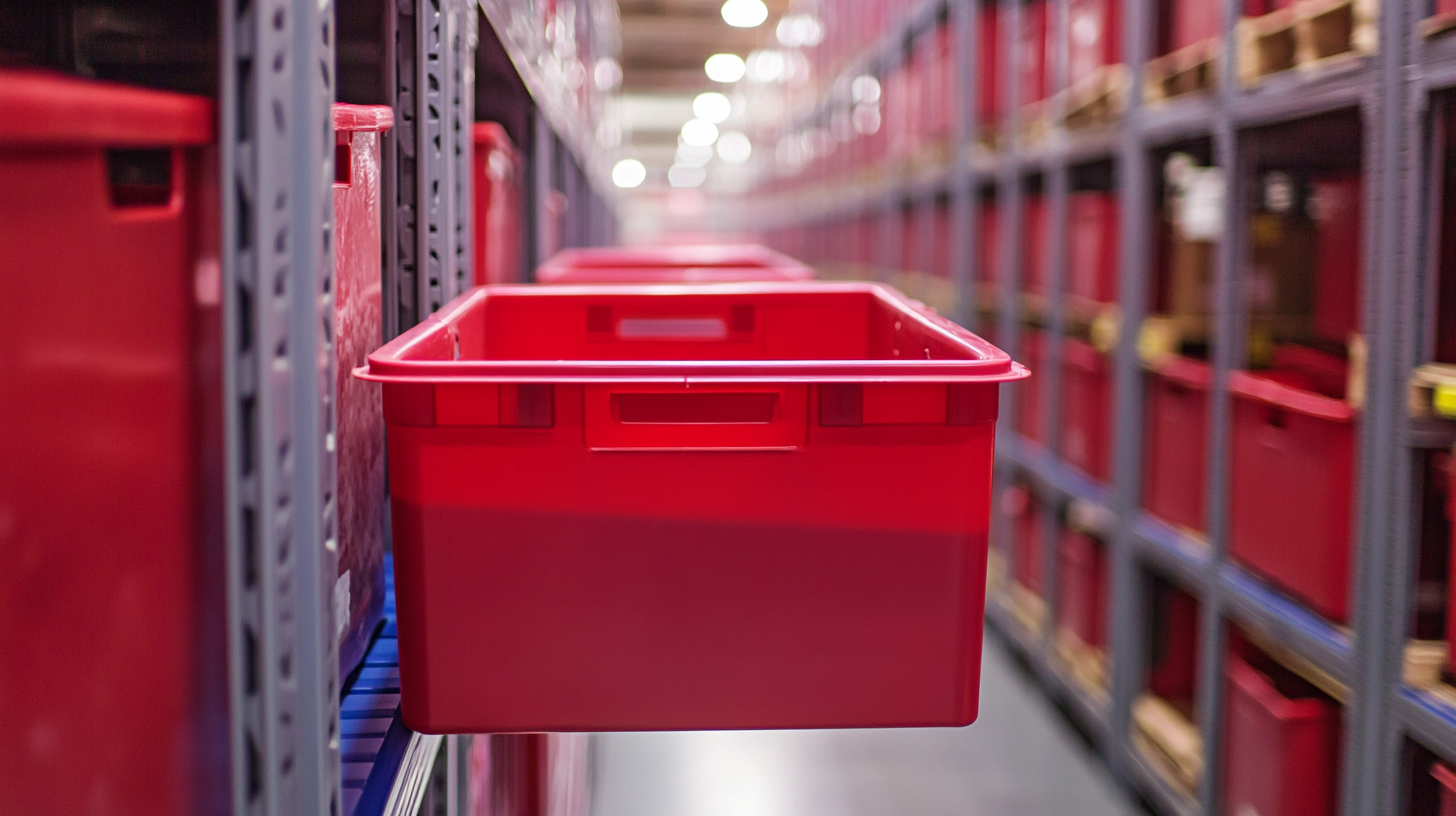
- export5@runpingpp.com
- 24 Hours Online



Industry News
7 Reasons Best Corrugated Plastic Totes Are Revolutionizing Supply Chain Efficiency
In today's fast-paced supply chain landscape, efficiency and reliability are paramount to success. A recent report by MarketsandMarkets highlighted that the global corrugated plastic market is projected to reach USD 37.30 billion by 2028, driven by the rising demand for innovative packaging solutions. The introduction of Corrugated Plastic Totes has emerged as a game-changer, offering manufacturers and suppliers enhanced durability, lightweight design, and unrivaled versatility. Unlike traditional materials, these totes are designed to withstand the rigors of transportation while reducing waste and overhead costs. As industries increasingly turn to sustainable practices, the shift to Corrugated Plastic Totes not only supports eco-friendly initiatives but also improves operational efficiency, making them an indispensable tool in the modern supply chain. With their robust qualities, these totes are proving to be the backbone of a revolution in logistical operations, setting new standards for quality and performance in manufacturing.

Enhanced Durability: How Corrugated Plastic Totes Stand the Test of Time
Corrugated plastic totes have become a game changer in supply chain management, particularly due to their enhanced durability. Unlike traditional cardboard containers, these totes are weather-resistant and designed to withstand harsh conditions, making them ideal for both indoor and outdoor applications. Their robust structure means they are less likely to tear or crush, ensuring that products remain secure throughout transit and storage. This durability reduces the frequency of replacement, leading to lower long-term costs for businesses while minimizing waste.
Moreover, the lightweight nature of corrugated plastic totes does not compromise their strength. They provide an excellent balance between strength and functionality, which is essential for optimizing supply chain processes. Businesses can stack these totes efficiently, maximizing storage space and enhancing logistics operations. The ability to reuse these totes multiple times further contributes to sustainability efforts, making them an ideal choice for companies looking to improve their eco-friendly practices while boosting efficiency. Ultimately, enhanced durability is just one of the many ways corrugated plastic totes are revolutionizing the supply chain landscape.
Lightweight Design: Boosting Efficiency and Reducing Shipping Costs
The integration of lightweight design in corrugated plastic totes is reshaping supply chain efficiency. By reducing the weight of shipping materials, companies are able to significantly lower their transportation costs. According to a report from Packaging Strategies, lightweight packaging can reduce shipping costs by up to 30%, a substantial saving for businesses operating on tight margins. This reduction is not only cost-effective but also contributes to greener logistics, as lighter loads mean lower fuel consumption and reduced carbon emissions during transit.
Furthermore, the ease of handling associated with lightweight plastic totes enhances operational efficiency. A study conducted by Smithers Pira indicates that companies utilizing these innovative totes report a 20% increase in productivity due to easier stacking, loading, and unloading processes. This operational improvement allows for faster turnaround times, ultimately leading to better service levels and customer satisfaction. As the supply chain industry continuously seeks ways to enhance efficiency and sustainability, the adoption of lightweight corrugated plastic totes is poised to play a crucial role in optimizing logistics operations.
7 Reasons Best Corrugated Plastic Totes Are Revolutionizing Supply Chain Efficiency
| Feature | Benefit | Impact on Efficiency | Cost Savings |
|---|---|---|---|
| Lightweight Design | Easier handling and transportation | Increases worker productivity | Reduces shipping costs by up to 30% |
| Durability | Resistant to damages and water | Minimizes product loss and replacements | Lowers storage and replacement costs |
| Stackable Design | Efficient use of storage space | Improves warehouse organization | Maximizes storage capacity, leading to lower rental costs |
| Reusability | Reduces waste over time | Promotes sustainable practices | Decreases long-term packaging expenses |
| Customizability | Adaptable for various products | Enhances operational flexibility | Reduces costs associated with multiple packaging types |
| Weather Resistant | Protects contents from moisture and temperature changes | Ensures product quality during transport | Reduces potential returns due to damage |
| Cost-Effectiveness | Affordable compared to traditional containers | Decreases overall supply chain expenses | Immediate savings on logistics |
Eco-Friendly Solutions: The Sustainability Benefits of Corrugated Plastic Totes
 Corrugated plastic totes have emerged as a game-changer in the realm of sustainable supply chain solutions. Unlike traditional materials, these totes are manufactured from recyclable plastics, which significantly reduces the environmental impact associated with packaging waste. The durability and lightweight nature of corrugated plastic not only enhance transportation efficiency but also diminish fuel consumption during logistics, leading to a smaller carbon footprint for businesses. Companies are increasingly proud to adopt these eco-friendly alternatives, showcasing their commitment to sustainability while simultaneously optimizing their operations.
Corrugated plastic totes have emerged as a game-changer in the realm of sustainable supply chain solutions. Unlike traditional materials, these totes are manufactured from recyclable plastics, which significantly reduces the environmental impact associated with packaging waste. The durability and lightweight nature of corrugated plastic not only enhance transportation efficiency but also diminish fuel consumption during logistics, leading to a smaller carbon footprint for businesses. Companies are increasingly proud to adopt these eco-friendly alternatives, showcasing their commitment to sustainability while simultaneously optimizing their operations.
Moreover, the adaptability of corrugated plastic totes contributes to their sustainability credentials. They are designed for multiple uses and can be easily cleaned and reused, minimizing the need for single-use packaging. This feature is particularly beneficial in industries that require frequent shipping and receiving of products, as it supports a circular economy mindset by extending the life cycle of packaging materials. With manufacturers more focused on eco-conscious practices, the transition to corrugated plastic totes exemplifies how innovative solutions can propel businesses towards greater efficiency while prioritizing the health of our planet.
Versatility in Applications: Meeting Diverse Supply Chain Needs
The versatility of corrugated plastic totes is redefining supply chain operations across various industries. These lightweight yet durable containers can be utilized in an array of applications, from warehousing to transportation. Their stackable design allows for efficient use of space, making them ideal for crowded storage facilities. Companies can seamlessly switch from one application to another, adapting quickly to changing logistical needs without the hassle of constantly sourcing different containers.
Moreover, corrugated plastic totes are not limited to traditional shipping purposes. They serve well in retail environments, assisting in the organized display and transport of products. In the automotive industry, they help manage parts and components throughout the assembly line. Their waterproof properties make them suitable for industries dealing with perishables or sensitive materials, ensuring that items are protected against moisture and environmental factors. This adaptability not only enhances operational efficiency but also reduces the overall costs associated with inventory management and product handling. As industries continue to seek innovative solutions, corrugated plastic totes stand out as a key player in meeting diverse supply chain needs.
Cost-Effectiveness: Maximizing ROI with Plastic Totes in Logistics
 In the ever-evolving landscape of supply chain logistics, the use of corrugated plastic totes is gaining prominence due to their cost-effectiveness and strong return on investment (ROI). Recent industry reports indicate that transitioning to these innovative containers can significantly reduce operational costs by up to 25% compared to traditional packaging solutions. This is primarily due to their durability, lightweight design, and reusability, which collectively contribute to lower shipping expenses and decreased waste generation.
In the ever-evolving landscape of supply chain logistics, the use of corrugated plastic totes is gaining prominence due to their cost-effectiveness and strong return on investment (ROI). Recent industry reports indicate that transitioning to these innovative containers can significantly reduce operational costs by up to 25% compared to traditional packaging solutions. This is primarily due to their durability, lightweight design, and reusability, which collectively contribute to lower shipping expenses and decreased waste generation.
Moreover, the integration of advanced technologies in logistic processes further complements the benefits of plastic totes. For instance, automated systems and warehouse robots are now capable of handling these lightweight containers efficiently, maximizing throughput. A report from the IMARC Group emphasizes that modern container manufacturing plants are optimized for cost and layout, enabling businesses to adopt more scalable solutions that meet the demands of a fast-paced market. As companies implement these strategies, they not only improve their supply chain efficiency but also enhance overall sustainability, positioning themselves as leaders in a competitive landscape.